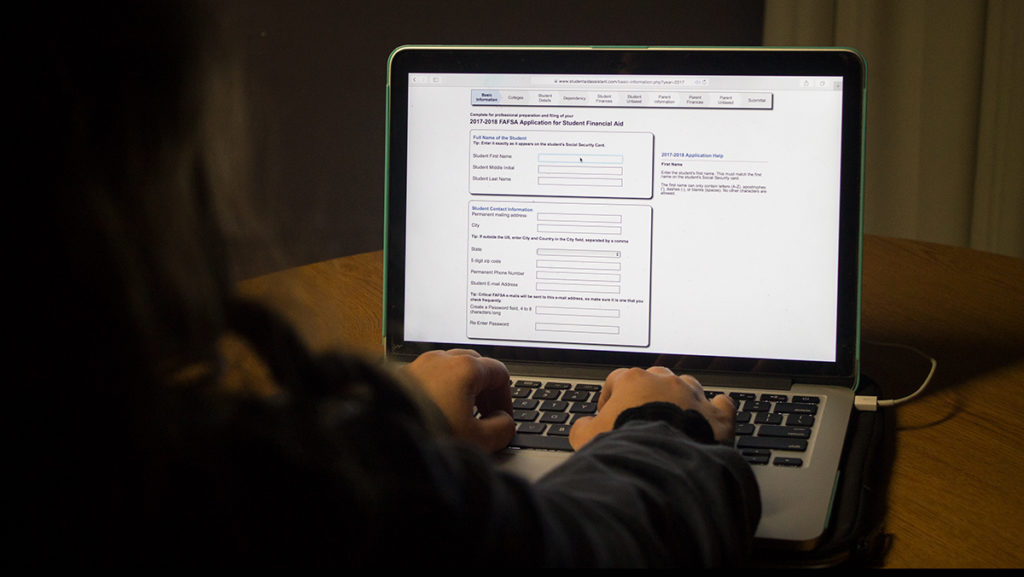The U.S. Department of Education has moved the filing date for the Free Application for Federal Student Aid to Oct. 1, three months earlier than the previous Jan. 1 date. Now, students can begin filling out the application in preparation for the 2017–18 school year.
Lisa Hoskey, Ithaca College’s Director of Student Financial Services, said this change will alleviate some of the stress that came with the process under the later filing date. For regular-decision students applying to the college, the FAFSA application priority deadline is Feb. 1, according to the college’s website.
In addition to providing three extra months before this deadline, the filing date change aligns more with the college admission process, and families can now provide income information from the prior-prior year, or two years before the respective school year, according to the U.S. Department of Education. For the 2017–18 academic year, this means students and families can now provide income information from the fiscal year 2015–16 rather than from 2016–17. Hoskey said this is the most significant change, as it allows for more certainty and less guesswork in providing income information.
Applicants can use the Internal Revenue Service’s Data Retrieval Tool to transfer data from their federal income tax returns directly to FAFSA. This limits the amount of additional information the Office of Student Financial Services asks students for, minimizes errors and reduces the chance of a financial award changing, Hoskey said.
SFS is working on sending out notifications to students to make sure they are aware of the filing date change. SFS also notified students of the date change on its homepage on the college’s website. Hoskey said she thinks the new date will make the process easier by giving students more time to complete the process and assess their options.
“This first year I’m sure we’ll run into the issues that you do when something is new,” Hoskey said. “But in the long run, it’s going to be much better for our students and our families.”
David Hawkins, executive director of educational content and policy for the National Association for College Admissions Counseling, which aids students and families pursuing postsecondary education, said in previous years, students would not be able to start the financial aid process until after the college application process was complete, or halfway done, as the filing period began Jan. 1, several months after most college applications go live.
He said students would get their college admission decisions, but would have to wait a couple of months to hear about how much aid they will be receiving. Hawkins said that now with the change, hopefully students will receive both their admission letter and financial aid letter earlier in the process, and in the end make better–informed enrollment decisions. Hawkins also said the hope is that students will receive their financial award earlier in the process.
“Right now, that’s a bit of a mystery to us,” Hawkins said.
Hoskey said she and other members of the department have supported this change for a while. She said the process can be stressful for some families, whether a family is lacking funding or unsure if it can meet college costs. However, this new filing date allows incoming students to compare their options, review information and decide what method of payment they will be using.
“I think it’s been a long time coming,” Hoskey said.
Ezeka Allen, vice president of business & finance of the Student Governance Council, said last year a bill was passed in support of hosting a “FAFSA Night.” She said this is not its official name yet, but the event would aid students who may be confused about the FAFSA process. Sign-ups for the FAFSA night will begin after fall break, and Allen said she hopes to hold the event in February.
“We’re trying to help students who don’t even know how to fill out their FAFSA or even know that they need to fill it out every year, and even students who are trying to figure it out, but don’t really know or have the resources because their parents can’t help them,” she said.
Allen said she wants to make a checklist for students to have during winter break so they can go over it with their parents. She said the hope is that when they return, they will have any questions ready to ask at the session. Allen said she is currently working with SFS to set up this event, where they will go over how to fill out the forms and discuss what certain requirements mean.
Allen said she struggled with the FAFSA process as a first–generation college student, which is why she brought up the bill. Allen said the financial aid process, on top of going to classes and doing academic work, can be an “extra stressor” for students, which is why she said the SGC wants to relieve some of this pressure.
“I’m still learning as well. I don’t know all of it; that’s why we’re having this,” Allen said. “But I think what we’re doing is going to help students more. I don’t know if the new filing date is actually helping students, but I think we’re trying to make it as easy as possible.”









